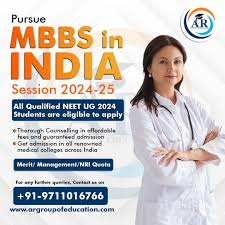In India, pursuing a Bachelor of Medicine and Bachelor of Surgery (MBBS) degree is considered a prestigious and rewarding career path. The process and requirements for admission to MBBS programs are highly regulated, involving multiple steps and criteria that must be met by aspiring medical students. This log provides a comprehensive overview of the admission process and requirements for studying MBBS in India, presented in a passive voice.
Eligibility Criteria
To be eligible for admission to an MBBS program in India, certain academic and age-related criteria must be met by the applicants:
- Educational Qualifications:
- Completion of the 10+2 (or equivalent) examination with Physics, Chemistry, Biology/Biotechnology, and English as core subjects is required.
- A minimum aggregate score of 50% in the qualifying examination is mandated for general category students. For candidates belonging to reserved categories (SC/ST/OBC), the minimum aggregate score required is 40%.
- Age Limit:
- The minimum age limit for applicants is set at 17 years as of December 31st of the year of admission. No upper age limit is specified for MBBS admission in most cases, although some institutions may have their own policies.
Entrance Examination
Admission to MBBS programs in India is predominantly based on performance in a national-level entrance examination:
- National Eligibility cum Entrance Test (NEET-UG):
- Conducted by the National Testing Agency (NTA), NEET-UG is the mandatory entrance examination for MBBS admissions across India.
- The examination consists of multiple-choice questions from Physics, Chemistry, and Biology (Botany and Zoology).
- A specified cutoff score must be obtained by candidates to qualify for further admission processes.
Application Process
The application process for MBBS admission in India involves several steps:
- Registration for NEET-UG:
- Candidates must register online for the NEET-UG examination through the official NTA website.
- Personal details, educational qualifications, and other relevant information must be provided during the registration process.
- An application fee is required to be paid by candidates to complete the registration.
- Admit Card and Examination:
- Upon successful registration, an admit card is issued to the candidates, which must be downloaded and printed.
- The NEET-UG examination is conducted on the scheduled date, and candidates are required to appear for the test at their designated exam centers.
- Result Declaration:
- NEET-UG results are declared by the NTA, and a rank list is published based on the scores obtained by candidates.
- Candidates who meet the cutoff criteria are considered eligible for the next stage of the admission process.
Counseling and Seat Allotment
The counseling and seat allotment process for MBBS admission in India is coordinated at both the national and state levels:
- All India Quota (AIQ) Counseling:
- Conducted by the Medical Counseling Committee (MCC), AIQ counseling is responsible for 15% of the total seats in government medical colleges across India.
- Eligible candidates are required to register for AIQ counseling and fill in their preferred choices of colleges and courses.
- Seat allotment is done based on the NEET-UG rank and the availability of seats in the chosen colleges.
- State Quota Counseling:
- State-level counseling is conducted by respective state authorities for the remaining 85% of seats in government medical colleges and for seats in private medical colleges within the state.
- Candidates must register with the state counseling authority and participate in the choice filling and seat allotment process.
- State-specific rules and regulations may apply during the counseling process.
- Deemed and Central Universities Counseling:
- Separate counseling is conducted for admission to deemed and central universities, including prestigious institutions like AIIMS and JIPMER.
- Candidates must register for these counseling processes separately and follow the specified procedures for seat allotment.
Documentation and Admission
After the seat allotment process, candidates are required to complete the admission formalities:
- Document Verification:
- Candidates must report to the allotted college with original documents and certificates for verification.
- Important documents include the NEET-UG scorecard, admit card, mark sheets of the qualifying examination, identity proof, and other relevant certificates.
- Payment of Fees:
- The admission fee, as specified by the college, must be paid by the candidates to confirm their admission.
- Fee structures may vary between government and private medical colleges.
- Medical Examination:
- A medical examination is conducted by the admitting college to ensure that the candidates meet the required health standards.
- Final Admission:
- Upon successful verification of documents and completion of all formalities, admission to the MBBS program is officially granted.
- Candidates are required to join the college and commence their studies as per the academic schedule.
Conclusion
The process of gaining admission to an MBBS program in India is rigorous and highly competitive. Aspiring medical students must meet the eligibility criteria, perform well in the NEET-UG examination, and navigate through the counseling and seat allotment procedures. By adhering to the specified requirements and procedures, candidates can secure a place in one of India’s esteemed medical institutions and embark on a rewarding journey in the field of medicine.










